

ECHOES
ADULT TEACHER COMMENTARY

Celebrate African American faith and cultural heritage with Echoes Curriculum
• Writers of color compose every teacher invitation and lesson introduction and contribute to many other sections of the lesson.
• Each quarter includes a Black history article featuring a biography of people of faith, an interview with a ministry leader, or an investigation of eras of social change.
• Each winter quarter, the Teacher Commentary includes a free poster that celebrates Black history.
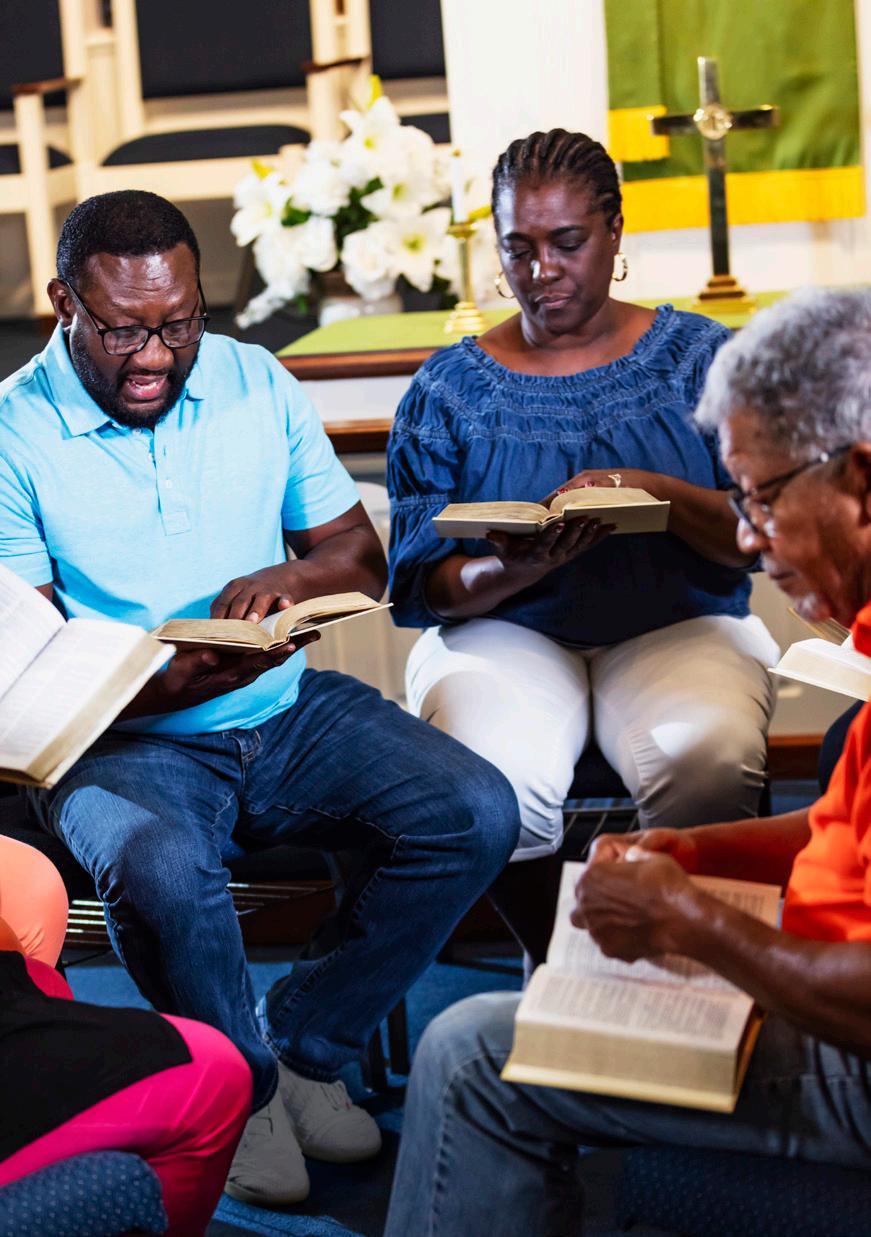

Echoes benefits your whole church.
This adult study series supports teaching according to the ISSL (International Sunday School Lessons) Uniform study plan, on Sundays and in readings throughout the week. This scope and sequence guides students through the major themes and texts of the Bible, with a new set of focuses every 6 years.
The ISSL study plan keeps students engaged, alternating between Old and New Testaments and providing guidance for how the Bible fits together: One Bible. One Story.




The sample lesson is from
the Adult Teacher
Commentary—a resource that will equip you to teach with confidence.
Explore these valuable features to see how the commentary will elevate your lessons:
• Insightful notes that unpack the canonical message of Scripture
• Personal encouragement and tips from experienced Bible teachers to guide your study
• Full text of both KJV and NIV® translations to give everyone an opportunity to study together—no matter which translation they prefer
• Discussion questions with ready-to-use answer suggestions to keep discussion going and spark curiosity
• Curated playlist suggestions for songs and worship to enhance engagement
• Easy access to commentary references from trusted authors like Warren Wiersbe
• A prayer practice, challenge, or focused takeaway that students can process throughout the week
• A closing prayer to end each session on a meaningful note


Empower your students and grow their understanding of Scripture with the comprehensive support you need.

Free Shipping with EZ Order—Save time each quarter and get free shipping on curriculum orders of $100 or more by joining the EZ Order auto-ship program.
Everything You Need for Effective, Real-Life
Bible Study
Echoes delivers trustworthy, biblical content that encourages life application through a variety of quarterly resources in addition to the Adult Teacher Commentary. You can get free downloadable samples of the following resources at EchoesCurriculum.com
Adult Resources Includes posters, discussion starters, and handouts to help students engage (one per classroom or group).



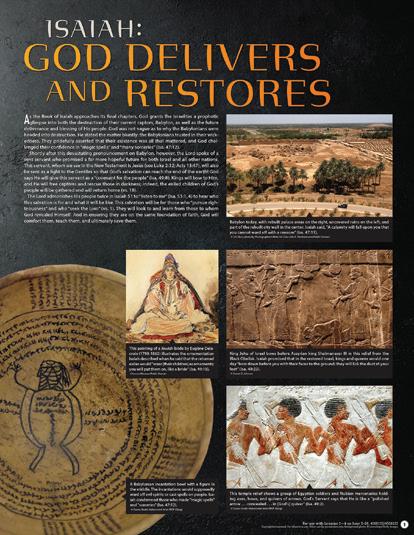

Adult Student Guide— Offers biblical commentary and life applications, plus printed Scripture references in both KJV and NIV®. Available in regular and large print.



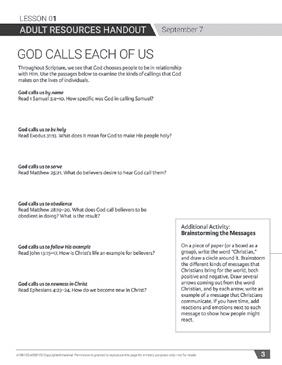






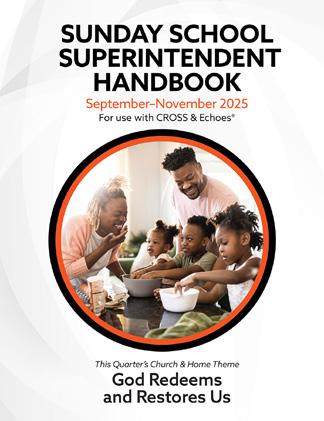
Unifying Echoes Sunday School Lessons for All Ages—
The Sunday School Superintendent Handbook equips leaders with key information for managing a Christian education program. While Echoes offers age-appropriate lessons for children, youth, and adults, the quarterly Church and Home Theme in the Handbook ensures that the entire church is focusing on a consistent biblical principle.
Features of the Handbook:
• Introductory discussion for each week that draws on the quarterly Church and Home Theme
• Suggested order of service and song selections for opening ceremonies
• Connections to each age-level’s lesson to offer insight for every age group
• Tips for conducting lesson reviews and coordinating sermons with Sunday school
Power for Living® Take-Home—
Connect students of God’s truth to compelling stories of faith; articles on unique ministries, world missions, spiritual trends; and reflections on key faith concepts, social concerns, prayer, and more. This resource has 13 weekly handouts to send home with students, share in church bulletins, or enhance an evangelism ministry (one per student).

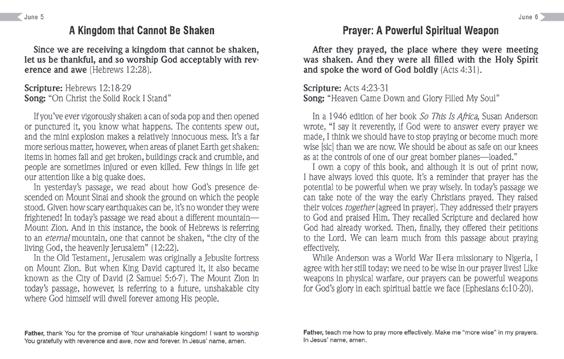
Quiet Hour® Daily Devotional Encourage students to go deeper into each week’s theme through their personal devotion time. The daily Quiet Hour devotional explores how a fellow believer has applied this week’s theme to their life, modeling the life application in tangible ways (one per student).

Bonus Leader Content Online— RealLifeDownloaded.com provides free teaching extras to enhance each week’s lesson:
• Additional teaching content to connect each week’s lesson to current news and events
• An alternative approach to “Start the Conversation” as you begin each lesson
• Links to contemporary and traditional Spotify® playlists, each with closely aligned song selections
• Links to relevant commentary, video and/or audio content, and sermons to support lesson preparation

Free Shipping with EZ Order—Save time each quarter and get free shipping on curriculum orders of $100 or more by joining the EZ Order auto-ship program.
LESSON 01 September 07
ISAIAH’S CALL AND MINISTRY
INVITATION
Prepare your heart and pause before you teach this lesson
I prayed for the Lord to heal my marriage. But after intensive counseling, that wasn’t what happened. Because of hardheartedness and a lack of repentance, we separated.
I was left the task of explaining to my children their father’s absence. When they left for school, I sat on the stairs of our home, crying my heart out. I felt like I’d disappointed God. I kept reviewing all the things I’d done that might have pulled my marriage apart.
And for years, I felt damaged and inadequate. I heard lies from the enemy, like, “God no longer wants you.” Then one day, the Holy Spirit took me back to that day on the stairs. I heard God’s truth— not in an audible way—but I knew the heavenly Father was saying to me, “Daughter, the enemy accuses. I am understanding and gentle.” He sat on the with me, ministering to my broken heart. He mourned with me. That day, no angel touched my lips (like the prophet in today’s story), but I experienced the Holy Spirit’s “touch” on my mind. I had previously seen God as a harsh judge, just waiting to pass out consequences for disobedience. But after God renewed my thoughts, I no longer felt inadequate. Imperfect as I remained, I wanted to be God’s messenger and to tell about the love of my heavenly Father.
Perhaps you have had an experience when God opened your eyes or changed the way you see. Has He started a renewal of your mind, cleansing the lies and replacing them with a truthful vision of Himself? Now might be the perfect moment to ask for the touch of God’s grace.
REALLIFEDOWNLOADED.COM
Find alternative lesson introduction, Spotify® playlists, and links to more teaching resources

On Traditional Worship Weekly, listen to Shane and Shane’s “Holy Holy, Holy (We Bow Before Thee).” These words mimic the song of seraphim as they bow before God in heaven (Isa. 6:3). On Echoes Worship Weekly, find inspiration from “You’re All I’m After” by Ke’Erron and Leeland.

LESSON FOCUS: God makes people His messengers.
LESSON SCRIPTURE: Isaiah 6:1–8; 38:1–5
1 Start the Conversation
Talk about what it can be like to carry messages for God.
2 Study Today’s Scripture
Isaiah and Hezekiah surrender and allow the holy God to bring transformation.
3 Apply the Message
Seek God’s calling in each area of life.
Suggested Materials: Ɏ Adult Resources: Reproducible Handout—“God Calls Each of Us”
4 Live It Out
Ask God to make us effective messengers.
For more commentary, see pp. 1159–60, 1182 in Wiersbe Bible Commentary: Old Testament.

A

A Look Ahead A Look Back

Connects previous and future lessons
This is the first week of the quarter and the first lesson that introduces the role of prophets, who are God’s messengers during a time when many have neglected their role as God’s holy people (see Ex. 19:6). In other lessons of the quarter, you will introduce Jeremiah and Ezekiel. This is a good week to display “Living Parables: The Life of Prophets” and to distribute the associated handout to your class. The first two paragraphs introduce the ministry of Isaiah.
Adult Resources Posters
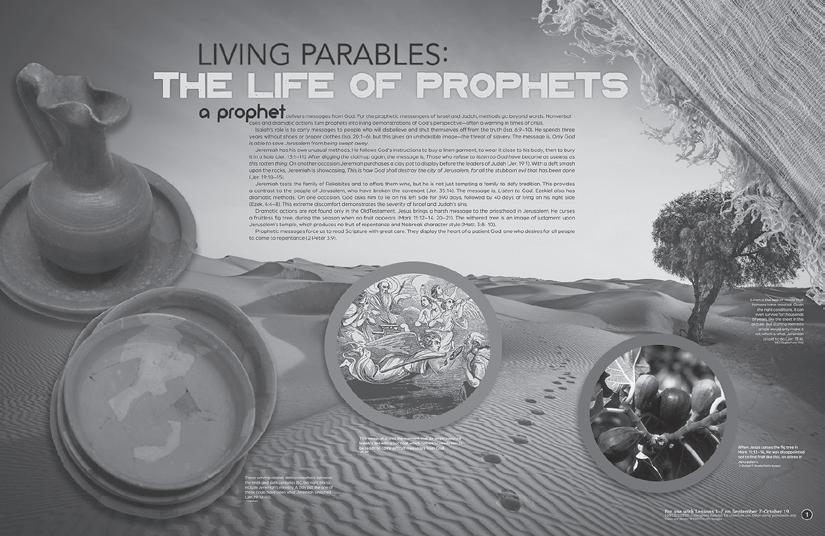
Additional resources to expand on key topics
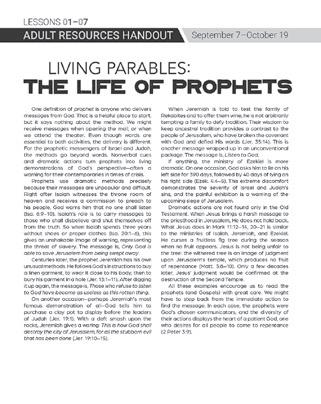
1 Start the Conversation
Talk about what it can be like to carry messages for God.
student guide
LESSON 01 page 03
ISAIAH’S CALL AND MINISTRY
Monette was quiet as she kneeled on a pillow. She had a difficult decision to make. Lord, help me know the right thing to do, she prayed silently.
Her close friend, Phyllis, was about to make a huge decision. Phyllis had found a partner to open a day spa. But this potential partner had ideas that seemed shady. She knew all sorts of contractors supposedly eager to help, but she didn’t have details about their experience. Monette couldn’t believe that her friend was preparing to take out a loan with a person she barely knew.
So far, she had kept her critical thoughts to herself. She wanted to see her friend succeed, and she seemed happy—so happy that she might not be thinking clearly. That was Monette’s fear.
A few days later, her eyes fell upon James 4:17: “If anyone, then, knows the good they ought to do and doesn’t do it, it is sin for them.” Monette knew that inaction was not an option.
Later that day, she was on the phone telling Phyllis the things she had noticed, urging Phyllis to slow down and ask more questions before partnering with someone.
“I’m glad you told me,” said her friend. “You’ve given me a lot to think about.”
Phyllis didn’t say she agreed. But, as if a weight was off her chest, Monette felt relief for having shared hard news.
“Lord, I probably wasn’t a perfect messenger, but thank you for helping me to share what my friend needed to hear.”
Discussion Questions and Answers
1 When have you been a messenger for someone else? What was that like?
Those who carry messages for others are asked to represent the sender. It means conveying tone as well as content. When we carry messages of God, we represent the Father in heaven.
2 What does it feel like to deliver either good or bad news?
Most of us will enjoy carrying good news: the birth of a new baby, the receipt of a promotion, the speedy recovery of a friend. But we might dislike carrying foul news or critical reports. Many people don’t want to be associated with this kind of message.
3 Have you ever felt that God was inviting you to join a “messenger service”? What might that entail?
Paul says that we act as messengers because “Christ’s love compels us,” not to build ourselves up or appear proud (2 Cor. 5:14). As His messengers, God gives us new insight in order to see people as He sees them, to speak the truth in love.

2 Study Today’s Scripture
Isaiah and Hezekiah surrender and allow the holy God to bring transformation.
Lesson Context
The New Testament quotes Isaiah about sixty times. Isaiah was a husband and father and—most importantly—a prophet of God, called to warn Judah of God’s coming judgment for wrongdoing. A prophet speaks for God and interprets God’s messages. In certain cases, prophets receive dreams and visions. Isaiah 1:1 gives a summary of Isaiah’s prophetic ministry: he serves more than sixty years under four kings of Judah. He calls the people to forsake idolatry and wickedness, to return to worship of the living God.
Points to Emphasize
Read Isaiah 6:1–8, and note the following:
• The death of King Uzziah meant the end of a stable era for Judah.
• Isaiah experiences a vision of God’s heavenly temple, the holy space filled by God’s undiluted presence.
• Isaiah fears that his sin, his “unclean lips” make him unworthy, but a heavenly creature touches his lips to cleanse them.
• Isaiah answers God’s call; he will be God’s messenger.
Teacher Commentary
Seraphim
God created all things, earthly and heavenly. Seraphim described in this text (seraphim is plural; seraph is singular) have a name associated with “burning” or “serpents.” These creatures of heaven are mentioned nowhere else in the Bible, and they are unlike other heavenly servants (compare cherubim in Isa. 37:16). A general view is that they are six-winged serpentine creatures with faces and hands like humans (a hand mentioned in v. 6). They have three pairs of wings—perhaps mimicking the threefold cry: “Holy, holy, holy.” Two sets of wings are used only to cover themselves, in reverent submission to the Lord of heaven.
Holy, Holy, Holy
Threefold repetition of holy gives it the highest degree of emphasis in Hebrew. Holiness is one of God’s essential attributes. It is part of God’s inherent nature, the most important thing that His servants emphasize in this scene (even more central than God’s might and power).
1 In the year that king Uzziah died I saw also the Lord sitting upon a throne, high and lifted up, and his train filled the temple. 2 Above it stood the seraphims: each one had six wings; with twain he covered his face, and with twain he covered his feet, and with twain he did fly. 3 And one cried unto another, and said,
Holy, holy, holy, is the Lord of hosts: The whole earth is full of his glory.
4 And the posts of the door moved at the voice of him that cried, and the house was filled with smoke.
5 Then said I, Woe is me! for I am undone; because I am a man of unclean lips, and I dwell in the midst of a people of unclean lips: for mine eyes have seen the King, the Lord of hosts.
6 Then flew one of the seraphims unto me, having a live coal in his hand, which he had taken with the tongs from off the altar: 7 And he laid it upon my mouth, and said, Lo, this hath touched thy lips; and thine iniquity is taken away, and thy sin purged.
8 Also I heard the voice of the Lord, saying, Whom shall I send, and who will go for us?
Then said I, Here am I; send me.
student commentary
A Holy Calling
The text begins with a date, the death of Uzziah, whose reign as king of Judah ends in tragedy and illness (see 2 Chron. 26:16–21). During his fifty-two years as ruler, Uzziah “did what was right in the eyes of the Lord” (2 Kings 15:3), and his passing means uncertainty for the nation facing threats abroad.
But the heavenly temple of God opens to reveal a vision to Isaiah: God is in control. He is “high and exalted,” and nothing escapes His attention (Isa. 6:1). Isaiah beholds the almighty God sitting enthroned in the heavenly temple, with all kinds of sights and sounds around Him. Isaiah sees the Lord’s flowing robe filling the sacred space (v. 1); he sees servants of God with unusual shapes (v. 2); and he hears these angelic creatures extolling God’s holiness and glory (v. 3). Just the sound of their voices causes an earthquake, while smoke—representing God’s glory—fills the temple (v. 4).
Historical background
Leaders see what students see

Isaiah 6:1–8
1 In the year that King Uzziah died, I saw the Lord, high and exalted, seated on a throne; and the train of his robe filled the temple. 2 Above him were seraphim, each with six wings: With two wings they covered their faces, with two they covered their feet, and with two they were flying. 3 And they were calling to one another:
“Holy, holy, holy is the Lord Almighty; the whole earth is full of his glory.”
4 At the sound of their voices the doorposts and thresholds shook and the temple was filled with smoke.
5 “Woe to me!” I cried. “I am ruined! For I am a man of unclean lips, and I live among a people of unclean lips, and my eyes have seen the King, the Lord Almighty.”
6 Then one of the seraphim flew to me with a live coal in his hand, which he had taken with tongs from the altar. 7 With it he touched my mouth and said, “See, this has touched your lips; your guilt is taken away and your sin atoned for.”
8 Then I heard the voice of the Lord saying, “Whom shall I send? And who will go for us?”
And I said, “Here am I. Send me!”

Provides potential answers (for teachers only)
Discussion Questions and Answers
1 What kind of message is sent to Isaiah through this vision of God in heaven?
This message is hopeful. Even in the uncertainty of political upheavals, God is still in control. God is seated on the throne of heaven, with holiness and majesty incomparable to creation. God’s administration of the world is not in doubt. He has messages to send to His people, and He is seeking the right messenger on His behalf.
2 Why does Isaiah say “Woe is me!” in God’s presence?
Even if the message is hopeful, Isaiah is intimidated by the vision of a holy God. He recognizes his weakness. As Proverbs 9:10 says, “The fear of the Lord is the beginning of wisdom.” Without the atonement or covering of sins, no human is worthy to stand before a completely holy God.
3 Why might Isaiah feel unprepared to act as God’s messenger?
Isaiah calls himself “a man of unclean lips” (v. 5). This probably is a general recognition of his frailty and sinfulness. Before all of God’s impressive heavenly servants, Isaiah might be wondering why God needs a man like him.
page 04
Isaiah is overwhelmed by this majestic scene, and he becomes acutely aware of his own weakness and frailty. In ancient cultures, standing before the throne of an earthly king would be terrifying; and Isaiah is even more terrified to face the Lord of heaven. “Woe is me!” he cries, for he knows himself to be “a man of unclean lips” (v. 5). We don’t know whether or not Isaiah has a particular sin in mind. But he is an imperfect person facing a holy and powerful God. In response to his recognition, God’s servant— one of these winged seraphim—flies to him carrying a burning coal (v. 6). The purifying heat touches Isaiah’s lips, and his sin is covered. The word atone can mean “to cover,” showing that Isaiah’s sins are removed in order to make him free to respond to God’s call. When God asks for a messenger, Isaiah accepts the role: “Here I am. Send me!” (v. 8). The very same unclean lips that felt unworthy in God’s presence would be used to carry God’s messages.
Teacher Commentary
King Uzziah
Take your class deeper with supplemental commentary
Uzziah played a major role in the direction of the southern kingdom of Judah. At the age of sixteen, Uzziah was declared king by the people. His reign began in 792 BC, alongside his father as a co-regent. His days as king were marked by times of great material prosperity and military campaigns. Uzziah claimed victories over the Philistines, toppling major cities.
Uzziah was a brilliant military strategist, using recaptured cities to protect Judah’s interests. He went to war against the Philistines and broke down the walls of Gath, Jabneh, and Ashdod. He rebuilt towns near Ashdod and elsewhere among the Philistines (see 2 Chron. 26:6). Although he was stricken with leprosy at the end of his life, Uzziah is said to have done what was right (2 Kings 15:3). That is why his death was such a blow to the nation.

Look for these key ideas in the Scripture
Points to Emphasize
Read Isaiah 38:1–5, and note the following:
• Isaiah is now well into his ministry as God’s prophet, decades later than his call described in Isaiah 6.
• The king at the time, Hezekiah, has become ill. He is also facing the crisis of attacking Assyrian armies.
• Isaiah’s message from God is not positive: Hezekiah should prepare to die.
• But after a sincere prayer of petition, Hezekiah receives fifteen more years of life and the strength to lead his people through crisis.
Teacher Commentary
Prophecy
Versus Magic
Communication with the divine realm (in antiquity, called divination) is an important profession for members of a royal court. Ancient methods of consulting the gods included reading the heavens, casting lots, interpreting dreams, or reading various signs. Isaiah’s message here is exceptional for two reasons. First, Isaiah initially gives bad news instead of telling the king what he wants to hear. Other ancient diviners would tend to flatter their lord, but Isaiah speaks the truth. Second, Isaiah apparently does not use any elaborate method of divination. He simply shares what God has told him.
A Psalm of Thanksgiving
Beyond the scope of the printed Scripture for today’s reading, Isaiah 38:9–20 contains a psalm or song-poem that expresses Hezekiah’s gratitude for the favor and the physical healing he has experienced. The structure of this psalm can be compared to others, like Psalm 30. At the beginning, Hezekiah expresses a complaint: “in the prime of [his] life,” he is about to die, which makes him feel “anguish of [his] soul” (vv. 10–15).
But in v. 16, the psalm switches from lament to joy, as Hezekiah experiences gratitude for a restoration of physical health. He notes in verses 18–19 that only the living can extol God’s faithfulness and pass this knowledge on to children. But tragically, Hezekiah utterly fails to sufficiently instruct his son to be faithful to God. Hezekiah’s son, Manasseh, would be considered among the most heinous and wicked of Judah’s kings.
1 In those days was Hezekiah sick unto death. And Isaiah the prophet the son of Amoz came unto him, and said unto him, Thus saith the Lord, Set thine house in order: for thou shalt die, and not live.
2 Then Hezekiah turned his face toward the wall, and prayed unto the Lord, 3 And said, Remember now, O Lord, I beseech thee, how I have walked before thee in truth and with a perfect heart, and have done that which is good in thy sight. And Hezekiah wept sore.
4 Then came the word of the Lord to Isaiah, saying,
5 Go, and say to Hezekiah, Thus saith the Lord, the God of David thy father, I have heard thy prayer, I have seen thy tears: behold, I will add unto thy days fifteen years.
student commentary
From Sickness to Victory
Since Isaiah is willing to carry messages for God, he can be asked to share either good or ill tidings. In this case, the context several decades later is the middle of a war. The powerful nation of Assyria is trying to capture all the territory of Judah. At this crucial juncture, the king, Hezekiah, has become deathly ill (v. 1). According to the parallel text of 2 Chronicles 32:25, it is the sin of pride that brought trouble upon him.
Isaiah comes to the king with a message from God: do not expect recovery. Hezekiah does not question whether this is from God; and the king responds with a tearful prayer that asks God, “Remember” (v. 3). It might seem like an odd request to God, but this word often refers to God’s covenant faithfulness (see Gen. 8:1; Deut. 9:27; Lev. 26:45).
Hezekiah’s prayer is asking God to look with favor upon his rule, since Hezekiah has “walked faithfully and with wholehearted devotion” (Isa. 38:3). He had broken down the places of idolatrous worship and followed God’s commands, unlike many kings before him (2 Kings 18:4–5). By facing the wall in prayer, Hezekiah shows that his request can only be answered by God.
God relents from the initial plan and message and adds fifteen years to the life of Hezekiah (see Isa. 38:5). At the same time that God extends


Isaiah 38:1–5
1 In those days Hezekiah became ill and was at the point of death. The prophet Isaiah son of Amoz went to him and said, “This is what the Lord says: Put your house in order, because you are going to die; you will not recover.”
2 Hezekiah turned his face to the wall and prayed to the Lord, 3 “Remember, Lord, how I have walked before you faithfully and with wholehearted devotion and have done what is good in your eyes.” And Hezekiah wept bitterly.
4 Then the word of the Lord came to Isaiah: 5 “Go and tell Hezekiah, ‘This is what the Lord, the God of your father David, says: I have heard your prayer and seen your tears; I will add fifteen years to your life.’” page 06
the life of Hezekiah, God also orchestrates a miraculous rescue for Judah and city of Jerusalem (Isa. 38:6). The Assyrians would soon be forced to withdraw, thanks in part to the prayers and courageous leadership of Hezekiah.
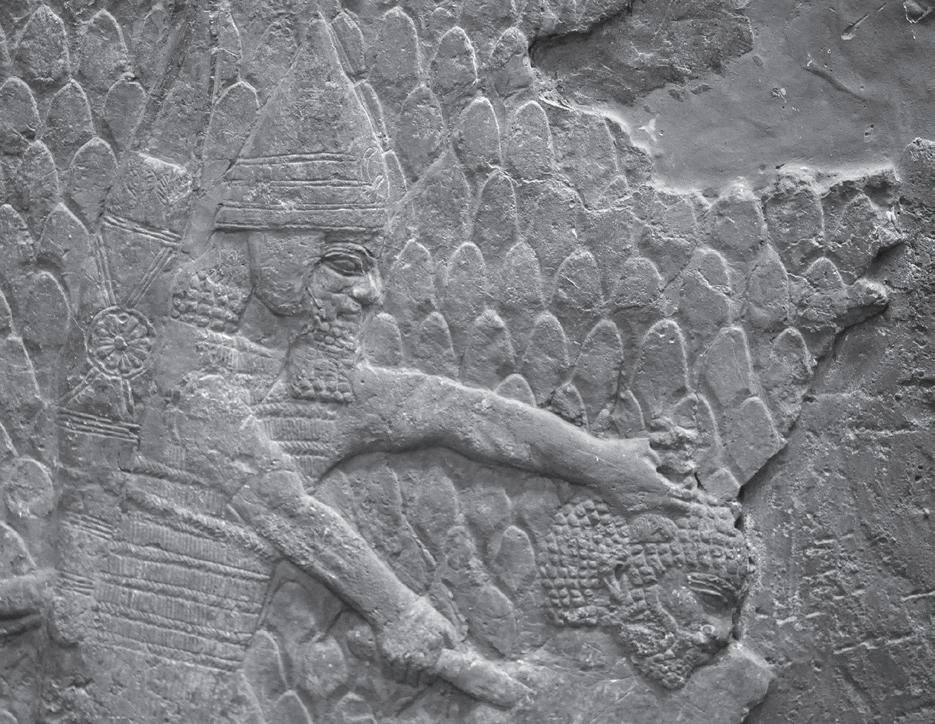
Discussion Questions and Answers
1 How does Hezekiah respond to news that his sickness would lead to death?
Hezekiah turns to the Lord. He humbles himself and relies upon God’s faithfulness. He uses the language of God’s covenant faithfulness to prompt God to “remember” his obedience.
2 Why might Hezekiah choose to pray with his face to the wall?
Hezekiah is a king in the line of David. Like most kings, he struggles with pride. God uses this sickness to capture Hezekiah’s attention and turn his heart back. Facing a wall is an image of his powerlessness for a king who usually faces obedient servants.
3 Why would God give Isaiah the first message, only to relent and give Hezekiah fifteen more years of life?
One valid answer is that we don’t know for sure. Isaiah’s job is to communicate precisely what God requires. But we do know the effect of telling Hezekiah that he would soon die: he calls upon the Lord and humbles himself in the face of an impossible obstacle. Hezekiah would need that kind of reliance upon God to lead the nation.
One Bible, One Story
Isaiah Points to Jesus
A prophet is sent by God, often to communicate difficult messages to a generation who rejects the news. That might help to illustrate why Jesus carries on the legacy of Israel’s prophets and quotes the words of Isaiah 6:9–10 (Matt. 13:14–15; Mark 4:12; Luke 8:10). Of course, as Son of God, Jesus is much more than a prophet, but He is certainly not less! Jesus is called a prophet many times in the Gospels (Matt. 21:11, 46; Mark 6:15; Luke 7:16, 39; 13:33; 24:19).
Like Israel’s prophets of old, Jesus faces rejection from his hometown and skepticism from listeners (Matt. 13:57; Mark 6:4).
In a departure from the other prophets, Jesus not only communicates warning but expresses personal desire to protect God’s people from harm, as only a loving God would be able to do (Matt. 23:37). Jesus is not just a messenger for God; He embodies the faithful devotion of God by trading His life as a sacrifice.
The brutality of the Assyrian king and his attacking army is shown by their own relief sculptures. In this part of an image depicting the capture of Lachish (a town of Judah), an Assyrian soldier is about to kill one of the captives.
Osama Shukir Muhammed/British Museum
Ties together Old and New Testaments
Engage your class with extra activities
3 Apply the Message
Seek God’s calling in each area of life.
From the two examples in the lesson, this devotion and conclusion shows that a “calling” from God might mean reckoning with our own uncertainties. We might not feel like the perfect candidates to be God’s messengers.
Discussion Questions and Answers
1 What are the sorts of responsibilities in our lives that we might surrender to God?
Most people have responsibilities that change depending on context. The same person can be a daughter, a wife, a mother, and an employee. Among other things, we need God to help us to balance the need to please others, the desire for novelty, or the desire to receive recognition.
2 Do you think turning to God is a one-time act or a repeated practice in Christian faith? Why?
For many, the initial decision to follow Christ is a turning point and a memorable event. But on a day-to-day basis, the Christian life is full of new opportunities to turn to God, to be restored after a pattern of sin or to grow closer in relationship with the heavenly Father. Perhaps we find that we thought that we surrendered everything, but we hadn’t yet brought everything under Christ’s lordship.
3 Does repentance make a larger impact on us individually or on others?
Repentance certainly impacts the individual. Like Isaiah— whose lips were touched by the hot coal—we have the opportunity to approach God’s holy throne, even when we feel unworthy. And a person whom God transforms is also ready to make an impact upon others, to go and share the Word of God without inhibition or hypocrisy.
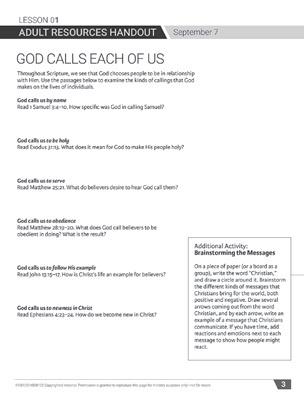
Adult Resources Handout
God Calls Each of Us
This handout asks respondents to reflect upon the callings in each of our lives: be holy, obedient, and following the example of Christ. The handout includes an alternative brainstorming activity.
student conclusion
A True Calling

Connects biblical themes to today
As Christians, we’re drawn toward a calling from God. We desire for our responsibilities at home, church, and even our jobs to hold heavenly weight. But sometimes the places we serve don’t feel fulfilling—so we think, “Perhaps this is not my calling.” Or, a job is dull and monotonous, so It can‘t my calling. Isaiah’s example shows that God has something different to say about the roles we play. Turning our attention to God and surrendering our lives can point us toward a calling, no matter the context.
In the first example, Isaiah sees heaven opened, and all his earthly concerns put into perspective by the awesome vision of God’s throne. Isaiah’s sinfulness is a problem, but God heals him and empowers him to speak. In the second example, King Hezekiah is powerless to save himself. He needs God’s intervention to preserve his life and save the nation. Both men—Isaiah, then Hezekiah—fulfill their vocation or “calling” by first demonstrating a willingness to turn to God.
Repentance, which means turning or changing our thinking, is central to finding our spiritual callings. It is the process of submitting to God’s transformation. We must relinquish control of the narrative (whether finding the perfect job, marriage partner, or context to serve) and submit to God’s leading. Ironically, it is often when we feel unprepared and powerless—when we lay our lives before God and confess our bent and broken ways—that we discover a new sense of mission. God always shapes our hopes and dreams into something more glorious than we would imagine for ourselves.

Challenge your class to apply the lesson

page 08
Surrendering to God’s Transformation
As you consider the lesson for today, when each of the two characters submitted themselves to God’s plan and purposes, ask God to show you any way that you might surrender to the calling He has for you.
What is one predicament or crisis that you need God’s help to solve? What kind of transformation might God accomplish, if you were to surrender to His purposes for your life?
4 Live It Out
Ask God to make us effective messengers.
Invite students to consider the prompt under “Surrendering to God’s Transformation.” Often because of stubbornness, we look for the next opportunity around the corner, rather than looking to grow into maturity, right where we have be placed by God.
Father,
We do not feel fit for Your service. We are flawed and self-righteous. Even when You call us to act as Your messengers, our first thought is about ourselves and what we lack. Help us to grow in courage, so that we can share about Your salvation with free hearts. We pray in Christ’s name. Amen.
Key Text
Also I heard the voice of the Lord, saying, Whom shall I send, and who will go for us? Then said I, Here am I; send me.
—Isaiah 6:8 KJV
Then I heard the voice of the Lord saying,“Whom shall I send? And who will go for us?” And I said, “Here am I. Send me!”
—Isaiah 6:8 NIV
Continue study throughout the week
Quiet Hour® and Cross Daily Bible Readings
Week of September 8 through September 13
Mon. Psalm 145:13–21—An Everlasting Kingdom. Tue. Matthew 3:4–12—A Call to Bear Good Fruit. Wed. Acts 3:12–20—A Summons to Repent. Thu. James 5:12–18—A Ministry of Care and Comfort. Fri. Exodus 12:3–14—A Feast of Remembrance. Sat. Deuteronomy 12:5–12—A Dwelling for God’s Name.
Next Week: 2 Chronicles 30:1–9, 26–27
Next week will cover one of the bright spots in Hezekiah’s rule as king. Come prepared to discuss the value of gathering in person.
®
As students are leaving, hand out copies of this week’s Power for Living® .


